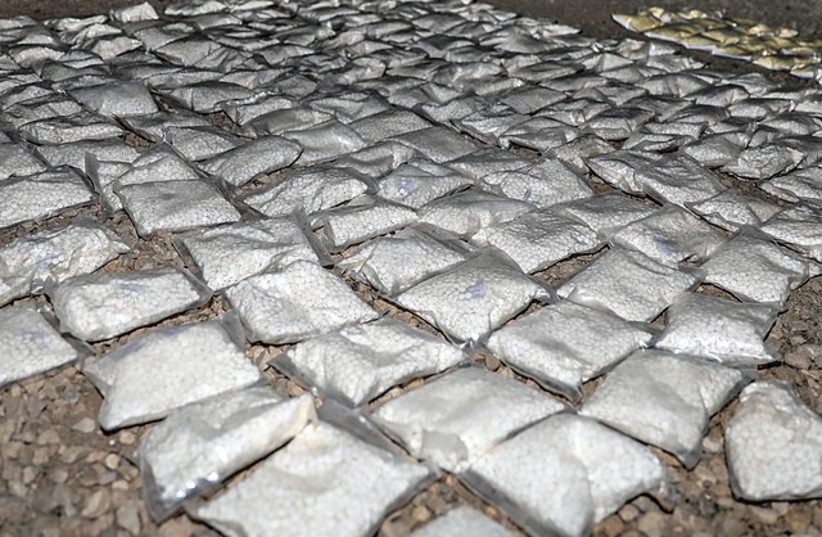Hezbollah's drug trade, especially Captagon production in southern Lebanon, funds its operations and poses a significant challenge to Israeli security and regional stability, former Mossad’s Terrorism Division Head Oded Ailam reported on The Telegraph on Sunday.
According to the report, Hezbollah manufactures the drug Captagon, also known as “poor man’s cocaine,” in hidden labs across southern Lebanon. The drug’s audience is reportedly the Gulf countries, mainly Saudi Arabia, with The Jerusalem Post reporting late October last year that Hamas terrorists had used the drug during the October 7 Massacre.
Profits from this trade, worth tens of millions, fund Hezbollah’s various activities, the report noted, including its terrorist attacks against Israel. Despite Islamic laws against drug trafficking, Ailam noted in the report, Hezbollah justifies the sales by targeting Sunni-majority Gulf states, which are seen as enemies of Shia Islam, which the terrorist organization represents.
Israel’s Northern Arrows offensive against the Lebanese terror organization, which included targeted strikes and destruction of terrorist infrastructure, had reportedly weakened the drug’s manufacturing in the country and its trafficking to other Gulf counties. However, the report stressed that the Captogan manufacturing efforts had not been destroyed in the country.
Pressure from the international community, especially the US, may push Israel toward a ceasefire, but stopping Hezbollah for good will require cutting off its money sources, especially from drugs, Ailam emphasized. Sales of Captagon constitute up to 40% of Hezbollah’s income, and targeting the organization’s drug labs in the Bekaa Valley could hurt its operations, Ailam further noted.

International support is also needed to sanction Lebanese banks that help Hezbollah launder drug money, Ailam emphasized, explaining that many Lebanese banks play a significant role in funding Hezbollah's activities with little consequence.
Drug manufacturing affects regional stability
Hezbollah fighters reportedly make around $1,500 monthly, while Lebanese soldiers earn just $300. This contrast highlights Hezbollah’s strong presence in the country, as it showcases the gap between the terror organization’s funding and Lebanon’s poorly funded army. Cutting Hezbollah’s drug income could weaken its power in the Shia community and reduce its ability to recruit.
A ceasefire deal between Israel and Hezbollah should include deploying the Lebanese army in southern Lebanon, where Hezbollah now holds control, Ailam stressed, explaining that strengthening the Lebanese army, with help from Gulf states and Israel, would help weaken Hezbollah’s influence in the country.
Emphasizing that the fight against Hezbollah cannot rely on military force alone and that targeting its drug trade and financial networks can damage its strength, Ailam concluded that by cutting Hezbollah’s income, the terrorist organization could be weakened, leading to better stability in the region.
The Captagon Act
In 2021, the US government called for the development of a comprehensive plan to dismantle the Captagon drug trade, which has become a significant funding source for Syria’s Assad regime, in a motion called the CAPTAGON Act (H.R.6265.)
The Act emphasizes the importance of collaboration among US agencies to target the production and trafficking networks connected to the Syrian government and groups like Hezbollah. It includes measures to impose sanctions and encourages collaboration with international allies to combat the trafficking of Captagon throughout the Middle East.
According to the Act, a key part of the strategy is to disrupt the supply chains for precursor chemicals used in Captagon production. Additionally, the Act seeks to enhance the counter-narcotics capabilities of nations most affected by Captagon trafficking, aiming for a robust international effort to counter Captagon production and trafficking.
Surge in Captagon trafficking, production
Over the past decade, there has been a significant increase in Captagon trafficking and production in the Middle East, according to a United Nations Office of Drugs and Crime (UNODC) report from March this year.
Captagon production has become a major illegal industry, according to UNODC’s report, with the largest drug seizures occurring in Saudi Arabia, followed by the UAE, Jordan, Lebanon, and Syria.
The rise in production is closely linked to the instability and conflicts in the region, particularly the civil war in Syria, which has turned the country into a major hub for Captagon manufacturing and distribution, according to UNODC. Furthermore, according to UNODC, the Syrian civil war has enabled the growth of Captogan manufacturing, with trafficking networks involving various armed groups, terrorist groups, and corrupt government officials.
Additionally, the report stressed that these groups, including Hezbollah and Iran-backed armed groups, are heavily involved in smuggling operations that transport Captagon through Syria, Jordan, and other countries in the region. The drug is particularly sought after in the Gulf states, where demand has skyrocketed over the years, thus funding terrorist organizations such as Hezbollah.
